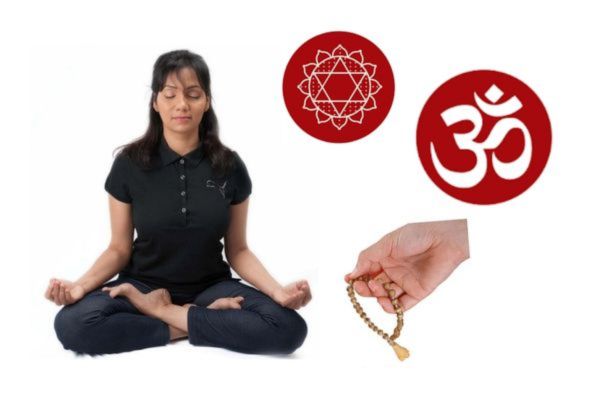In today’s fast-paced world, stress has become an inevitable part of life for many people. From the demands of work to personal responsibilities and societal pressures, individuals often find themselves overwhelmed by stress. While various methods exist to manage stress, one approach that has gained significant attention is Bhakti Yoga. Bhakti Yoga, often referred to as the yoga of devotion, offers a holistic approach to reducing stress by cultivating a deep connection with the divine through practices such as prayer, meditation, chanting, and selfless service. This article explores the principles of Bhakti Yoga and how engaging in its practices can effectively alleviate stress levels.
Paths of Yoga:

The four paths of yoga, also known as the four yogas, are ancient spiritual disciplines that offer different approaches to achieving enlightenment and self-realization. Each path is designed to suit different temperaments and inclinations, allowing individuals to find the one that resonates most with them.
- Karma Yoga (actions)
- Jnana Yoga (knowledge)
- Raja Yoga (mental discipline)
- Bhakti Yoga (emotions)
Bhakti Yoga teaches that all beings are interconnected and encourages practitioners to see the divine in everyone and everything. Through the practice of devotion, individuals can experience profound states of bliss, love, and unity with the divine.
Understanding Bhakti Yoga:
Bhakti Yoga, one of the traditional paths of yoga outlined in ancient Indian texts like the Bhagavad Gita, emphasizes the cultivation of love, devotion, and surrender to a higher power. Unlike other forms of yoga that primarily focus on physical postures (asanas) or breath control (pranayama), Bhakti Yoga centers on developing a heartfelt relationship with the divine. The Sanskrit word “Bhakti” translates to devotion or love, indicating the essence of this path.
Core practices of Bhakti Yoga:

The core practices of Bhakti Yoga are designed to foster love, surrender, and union with the divine. Here are some key practices:
- Bhajan (Devotional Prayer and Singing): Bhajan, or devotional singing, is a central practice in Bhakti Yoga. Practitioners chant prayers, hymns, and mantras that express their love and devotion to the divine. Bhajans are often accompanied by musical instruments such as harmoniums, drums, and cymbals. Through the repetition of sacred sounds and melodies, practitioners invoke a deep sense of connection with the divine and experience states of joy, ecstasy, and surrender.
- Kirtan (Group Chanting and Singing): Kirtan is the communal chanting of sacred mantras and hymns in a group setting. Participants gather together to sing, clap, and dance in devotion to the divine. Kirtan creates a powerful collective energy that uplifts and inspires all present. It fosters a sense of unity and interconnectedness, transcending barriers of language, culture, and religion. Kirtan is often accompanied by call-and-response singing, where a leader chants a line or phrase, and the group responds in unison.
- Puja (Ritual Worship): Puja is the ritual worship of deities or divine beings. Practitioners offer flowers, incense, food, and other symbolic offerings to the deity with love and devotion. Puja ceremonies involve elaborate rituals, prayers, and hymns that honor and invoke the presence of the divine. Through the act of puja, practitioners express their gratitude, reverence, and surrender to the divine, deepening their connection and devotion.
- Meditation & Mudras: Meditation purifies the mind, calms the senses, and cultivates concentration and devotion. It is a powerful practice for invoking the divine presence within and experiencing inner peace and joy. Whereas, mudras are symbolic gestures that channel energy flow and reflect intention.
- Seva (Selfless Service): Seva, or selfless service, is an essential aspect of Bhakti Yoga. Practitioners engage in acts of kindness, charity, and service to others without expecting anything in return. Through selfless service, practitioners cultivate humility, compassion, and love for all beings.
- Satsang (Association with the Wise): Satsang refers to the company of spiritual seekers and wise teachers. Practitioners gather together to listen to spiritual discourses, share experiences, and engage in devotional practices. Satsang creates a supportive and uplifting environment where practitioners can deepen their understanding of spiritual teachings, receive guidance, and draw inspiration from fellow seekers on the path of Bhakti Yoga.

Benefits of Bhakti Yoga in Stress Management:
- Stress Reduction: The practices of Bhakti Yoga, such as prayer, meditation, chanting, and selfless service, have been shown to significantly reduce stress levels by promoting relaxation, inner peace, and emotional resilience.
- Enhanced Emotional Well-being: Bhakti Yoga fosters a deep sense of connection, love, and gratitude, which are essential for emotional well-being. By cultivating positive emotions and attitudes, individuals can better cope with stressors and maintain a positive outlook on life.
- Improved Mental Clarity: Regular practice of Bhakti Yoga helps to quiet the mind, improve concentration, and enhance mental clarity. This mental clarity enables individuals to approach challenging situations with greater clarity and perspective, reducing stress and anxiety.
- Greater Sense of Purpose: The philosophy of Bhakti Yoga emphasizes serving others and living a life of purpose and meaning. By aligning one’s actions with higher values and principles, individuals can transcend personal worries and find fulfillment in contributing to the welfare of others.

Summary:
In conclusion, Bhakti Yoga offers a profound approach to easing stress levels and promoting overall well-being by cultivating love, devotion, and surrender to the divine. Through practices such as prayer, meditation, chanting, and selfless service, individuals can transcend their worries and anxieties, finding solace in the realization that they are part of something greater than themselves. By incorporating Bhakti Yoga into their daily lives, individuals can experience lasting stress relief, enhanced emotional well-being, and a deeper sense of purpose and fulfilment.
